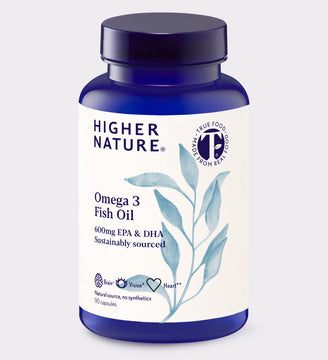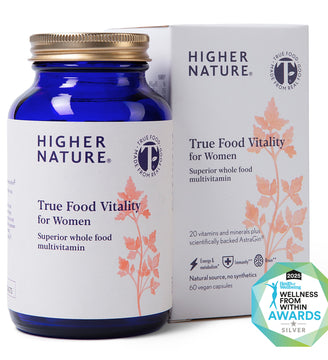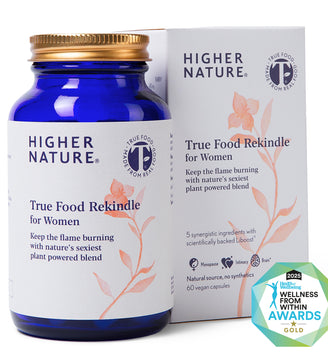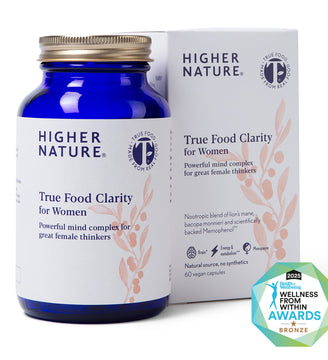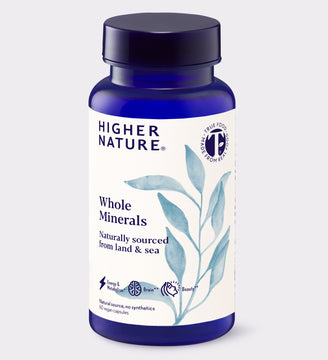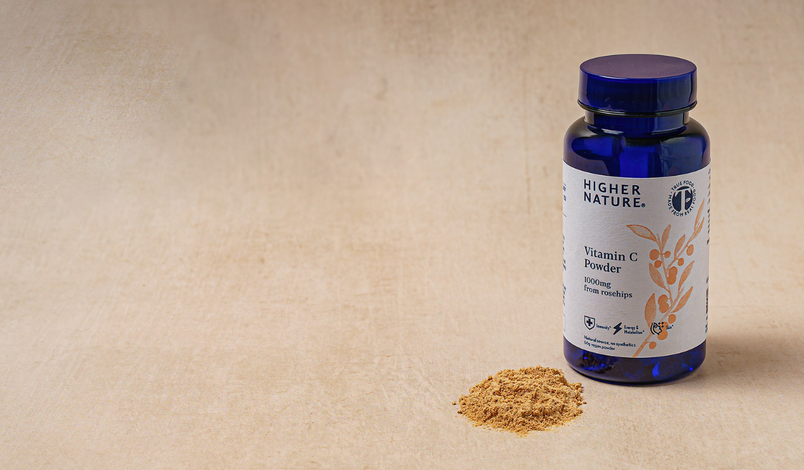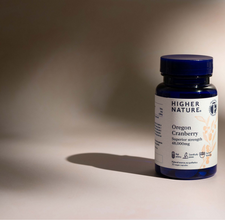
Focus On: Gentle Iron Complex
Elizabeth Houston - Higher Nature Nutritional Therapist - Dip BCNH mbant mCNHC
Iron deficiency is a common issue and is especially prevalent for woman of menstruating age or those on plant based, vegetarian or vegan diets. Often customers ask how our Gentle Iron Complex is different than what they have been recommended from their doctors or pharmacy, as a common complaint from prescription iron supplements is that they cause digestive distress and constipation.
One of Irons primary roles is aiding in the transport of oxygen through the bloodstream. Haemoglobin, the oxygen-carrying protein in red blood cells, relies on iron to function effectively. Without sufficient iron, the body's ability to transport oxygen is compromised, leading to fatigue and weakness. Iron is also important in keeping your skin, hair, and nails healthy and your brain and immune system functioning properly. Always ask for a test from your GP if you suspect iron deficiency.
Understanding tests, you may have the following test results:
Ferritin: (Ferritin test measures how much iron is stored inside cells) Ferritin is measured in an iron panel. Healthy levels start at 40 micrograms per litre (µg/L) for men and 20 µg/L for women. Levels below 10 µg/L may be a sign of anaemia.
Red blood cell count (RBC) measures the level of red blood cells in blood and is a reliable indicator of anaemia, normal Red blood cell count would be around:
men – 4.0 to 5.9 x 10*12/L women – 3.8 to 5.2 x 10*12/L
(source NHS 2024).
Symptoms of low iron or iron deficiency (Anaemia) include:
tiredness and lack of energy
shortness of breath
noticeable heartbeats (heart palpitations)
paler than usual skin
headaches
hearing ringing, buzzing or hissing noises (tinnitus)
food tasting strange
feeling itchy
a sore tongue
hair loss – more hair coming out when brushing or washing it
wanting to eat non-food items, such as paper or ice (pica)
finding it hard to swallow (dysphagia)
painful open sores (ulcers) in the corners of the mouth
nail changes, such as spoon-shaped nails
restless leg syndrome (source NHS 2024).
Causes
The most likely causes for low iron levels are blood loss such as heavy menstrual periods or poor diet (vegans and vegetarians are particularly susceptible). Other possible causes include, pregnancy, malabsorption — for example, coeliac disease, IBD, internal bleeding such as gastrointestinal, certain drugs, inherited disorders and some cancers.
How much iron is needed from food/supplements? Most people will require the following:
|
|
Daily iron requirements |
|
Adolescent males (11-18) |
11.3mg |
|
Adult males (19+) |
8.7mg |
|
Females 11-50 years (pre-menopause) |
14.8mg |
|
Adult females (post-menopause) |
8.7mg |
There are two main types of iron found in food — haem and non-haem iron.
Haem iron. This type of iron comes from haemoglobin. Haem is better absorbed by the body and is commonly found in liver, meat, poultry and seafood.
Non-haem iron is commonly found in plants such as beans, nuts, seeds and certain vegetables like spinach and potatoes. Iron is also added to foods such as tofu, grains, bread and cereal.
In supplements, you will find iron in the following forms:
Iron fumarate, Iron sulphate these are often prescribed by the NHS, unfortunately not only are they poorly absorbed they are also associated with causing digestive upset such as constipation.
The absorption of iron from Iron fumarate and Iron sulphate is reduced if taken concurrently with:
Zinc or magnesium salts (for example in antacids).
Calcium (for example in milk and dairy products).
Tannins (for example in tea, coffee, and cocoa).
Iron gluconate, this actually contains very little elemental iron 300mg = 35mg elemental iron (NICE 2024).
Iron bisglycinate
Our Gentle Iron Complex provides iron in the ferrous bisglycinate form which has been demonstrated to have at least two-fold higher bioavailability and absorption compared to conventional iron salts, including ferrous sulphate and ferrous fumarate. Studies show taking ferrous bisglycinate 25 mg iron is as effective as ferrous sulphate 50mg for those with iron deficiency and anaemia during pregnancy.
The iron is bound to two molecules of the amino acid glycine, hence the term 'bisglycinate'. This unique combination is a chelated form of iron. The process of chelation makes the iron molecule more stable and easier for the body to absorb. Supplementation with ferrous bisglycinate results in significantly fewer reported side effects such as constipation as compared with other forms of iron supplements.
Ferrous bisglycinate is also less likely to be blocked by other nutrients like calcium, or elements of the diet like tea or wholegrains which can impede absorption. We added copper and vitamin B2 to our Gentle Iron Complex which are both needed for iron metabolism in the body, and natural vitamin C from acerola fruit which helps iron absorption in the gut.
Taking Larger doses of iron are not helpful for increasing iron levels as they stimulate a protein in the body called hepcidin. Hepcidin is a key regulator of the entry of iron into the circulation, very high levels of hepcidin actually decrease gut iron absorption.
Thus there is mounting evidence indicating that low doses are more effective and better tolerated than the traditionally recommended 100 to 200mg of elementary iron per day. There is also evidence that patients may do better with a single dose in the morning rather than the usual split dose recommendation.
For further advice please contact Nutrition Support.


